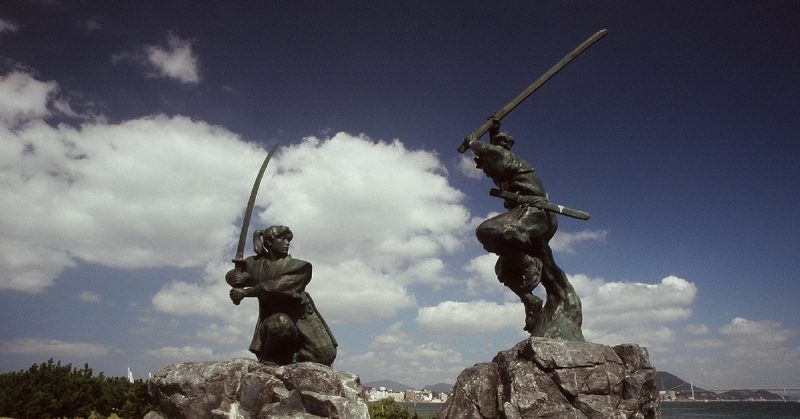Miyamoto Musashi was three hours late. This was his way. On the beach the tension in the air was palpable. Sasaki Kojiro paced up and down on the fine sand with his hands behind his back. His wrath was rising with the sun, and with every passing minute he felt the insult to his honour growing. The date was the 13th of April, 1612.
Kojiro was considered one of the greatest Samurai in Japan. He was famous throughout the land for his speed and precision, which was made even more remarkable by his preferred weapon. He wielded a huge no-dachi blade, a curved Japanese sword in the classic style, but with a blade over a meter in length. The size and weight of the no-dachi made it a brutal, unsubtle weapon, but Kojiro had perfected its use to a degree unheard of in all Japan.
As his skill had grown, he had won many duels, and by the time he waited on the beach at Ganryu Island he had secured a comfortable position as weapons master to the Daimyo of the Hosokawa clan. His fame had grown with his skill, and eventually, he came to the attention of Miyamoto Musashi.
Musashi was a Ronin, a masterless Samurai. He had killed his first opponent in single combat at the age of thirteen and had gone on to win duel after duel as he travelled Japan and honed his skills. In Japan at the time, it was not unusual to challenge others to duel, even to the death, for no other reason that to display one’s mastery. Musashi was no exception. His talent was so great that, by the age of thirty, he had sheathed his two katana, and made a point of duelling only with bokken – wooden practice swords – no matter what weapon his enemy chose to use.
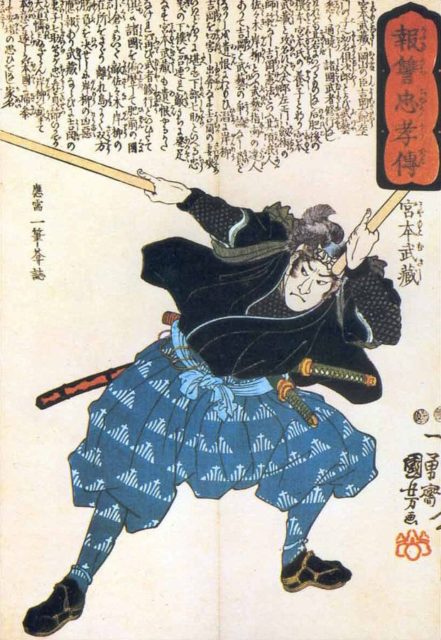
Kojiro’s retinue consisted of body servants, friends, students, cooks, and a clutch of officials who had come to witness the event and report back to the daimyo. They had arrived by boat in the early morning, and the servants had raised a shade for the officials further up the beach. A small fire had been started, food and tea prepared, and all made ready for the great Samurai to meet his opponent. The duel had been arranged through an intermediary at Miyamoto’s request, and the date and time set by him.
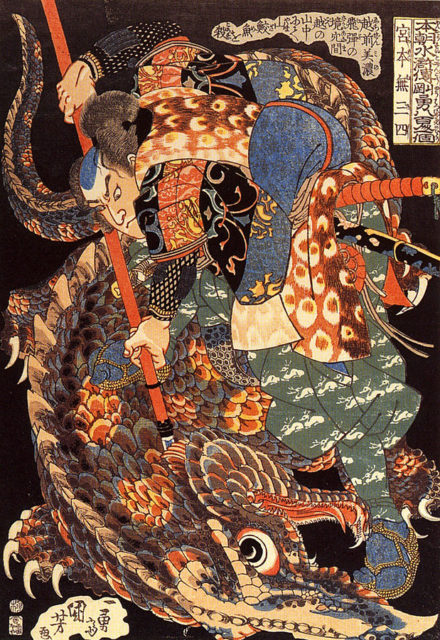
Kojiro had arrived three hours early, and as dawn slowly broke and his servants busied themselves with setting up camp, he had sat in profound meditation some way away, mentally preparing himself for combat. He rose some time before his opponent was due to arrive and took a little tea, making polite conversation with the officials, and joking with his friends. His composure was sublime, and his retinue, students and hangers on had no doubt that he would make short work of his challenger.
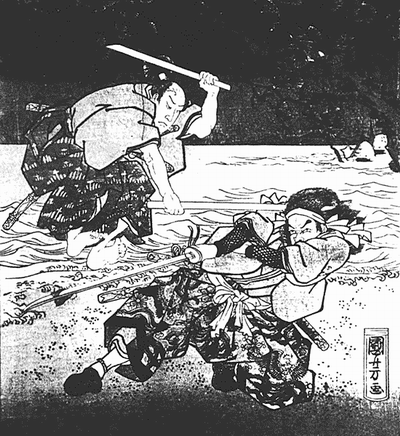
Three hours later, however, the morning was wearing on into the afternoon, and Kojiro was no longer composed. He paced, he grumbled, he swore and snapped at his servants, and it was clear to those who watched him that his rage at his challenger’s insulting behaviour was building to a dangerous degree. In an attempt to placate him, one of the officials had suggested that Musashi would not arrive, and had fled the duel in terror at the prospect of facing the great Kojiro, but Kojiro did not accept this. He knew Musashi’s reputation as a swordsman. This behaviour could only be intended to insult.
In fact, Miyamoto was not far away. He sat cross-legged in a little fishing boat that bobbed gently on the tide in a small inlet to the south of the beach where the enraged Kojiro paced. The bottom of the boat was piled with curled wood shavings, as the sword master unhurriedly worked at a long piece of wood with his knife. Also occupying the boat was its owner, an elderly, wrinkled, sun-browned fisherman, who had been paid handsomely to put himself, his boat and his spare oar at Musashi’s service for the day.
This spare oar was now sitting on Musashi’s lap, and with his sharp knife, the Samurai had carefully spent the morning bringing a new shape out of it. It was long and had become gracefully curved and perfectly balanced: a bokken of the finest workmanship. Musashi watched the sun as he worked.
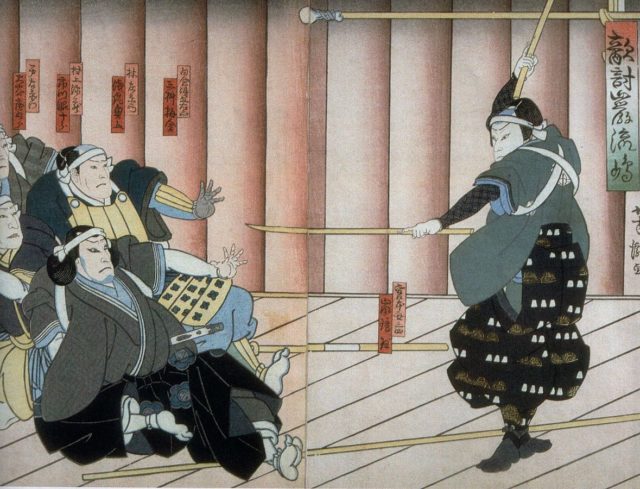
He was a strange looking person. He wore no finery, just a simple robe and sword belt. His feet were bare, and his eyes had a protruding, staring quality that was unnerving. His hair was tied into a simple, functional bun at the top of his head. There were several days growth of beard on his pale and bony face, and his skin was covered with many small, livid scars.
It was clear on close inspection that he had not washed for some time, and his plain robe bore many stains and discoloured patches. Altogether he cut a most disreputable figure, very different from the ostentatious displays of wealth and arms favoured by many Samurai of the time. The only part of his attire that seemed well cared for was the paired katana at his belt. The polished dark wood of their sheaths gleamed in the morning sun.
With a quiet word, Musashi asked the fisherman to take them round to the beach where Kojiro waited. The fisherman obeyed, and together they rowed out to sea a little, before turning back to approach the beach.
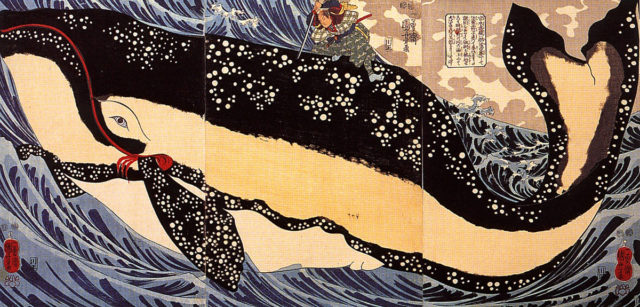
At first, Kojiro did not recognise his opponent. Musashi sat low and forward in the little boat, his weapons hidden, seeming deep in thought.
“It’s him!” cried one of the servants, who had run down to the water line. “Musashi comes to the duel!”
The blood drained from Kojiro’s face as Musashi slowly stood up in the boat. The insolence, it was unheard of. This was no way for a Samurai to behave! To arrive so late was bad enough, but to arrive like this… Unshaven, filthy, in dishevelled clothing and with no retinue but a beggarly old fisherman; Kojiro felt the insult to his honour most keenly, and the wrath that had been slowly building all morning boiled over. He trembled with rage and held out one hand to the sword bearer who rushed up to present him with his great no-dachi.
The huge sword flashed in the sun as Kojiro charged down the beach toward his opponent. He focussed his anger to a fine point, which ran through his arms and hands and settled at the cruel tip of the blade. In his mind, where a moment ago there had been great anger, now there was silence. But what was this? Musashi leapt into the surf and dashed to the left, but he drew no blade; his only weapon was a wooden bokken, similar in size and reach to Kojiro’s sword. Kojiro faltered for a split second.
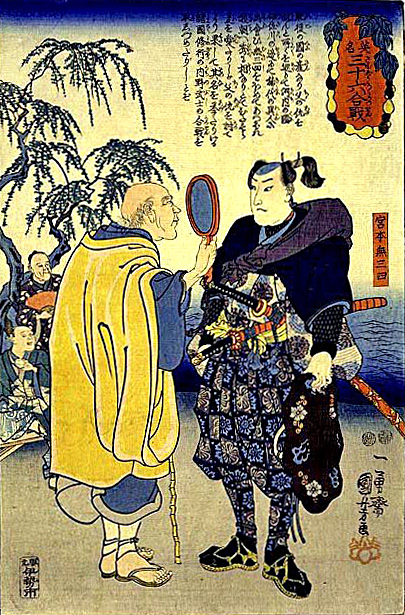
What could this mean? The arrogance of the man who would challenge the great Kojiro with a wooden practice sword was incomprehensible. He turned to follow Musashi and dived in with a great sweep of his blade. The insolent man ducked just in time to avoid the blow. The no-dachi swept only centimetres above his head. A little cloud of black hair floated in the still air.
Then Musashi was in underneath his guard. The bokken was rising, but the huge no-dachi was in the hands of a master, and Kojiro did not back away. He brought his sword whistling down upon his opponent… but Musashi was gone. He had stepped step to the right, and his bokken hit flesh. Kojiro’s breath went out of him, and his next blow went wild.
The wooden sword dealt him a stunning blow on the side of the head and in the moment that he staggered, his enemy’s weapon smashed into his left side with incredible force. He felt his ribs crack, followed by a terrible, sharp pain deep inside his chest. He couldn’t breathe, and the world swam before his eyes.
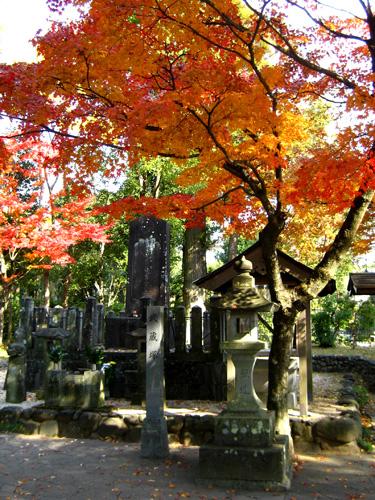
The officials, staff and servants watched in horror as Sasaki Kojiro toppled forward onto the sand. The engagement had been over in seconds, and the victorious Samurai was now bowing low to his downed opponent, then toward them. He watched them for a moment, poised, then began to retreat swiftly toward the boat. There was a ring of steel and a yell as a number of Kojiro’s friends, and students drew their swords and ran down the beach toward Musashi, but he was in the surf, he was in the boat, he was gone. His purpose on Ganryu island was fulfilled, but tears fell from his strange eyes as the old fisherman rowed them away.
Miyamoto Mushashi was victorious, but he had destroyed one of the greatest warriors in the land, and the pointlessness of the act hit him as hard as his own death blow had hit Kojiro. There was nothing gained by his victory, and everything lost. Like Mushashi’s bokken, Kojiro’s skill had been slowly carved out of the raw material of his life. Now he was gone, but his death had served no purpose.
Musashi continued to study and teach the art of swordsmanship throughout his life, but he never again killed an opponent in a duel.
